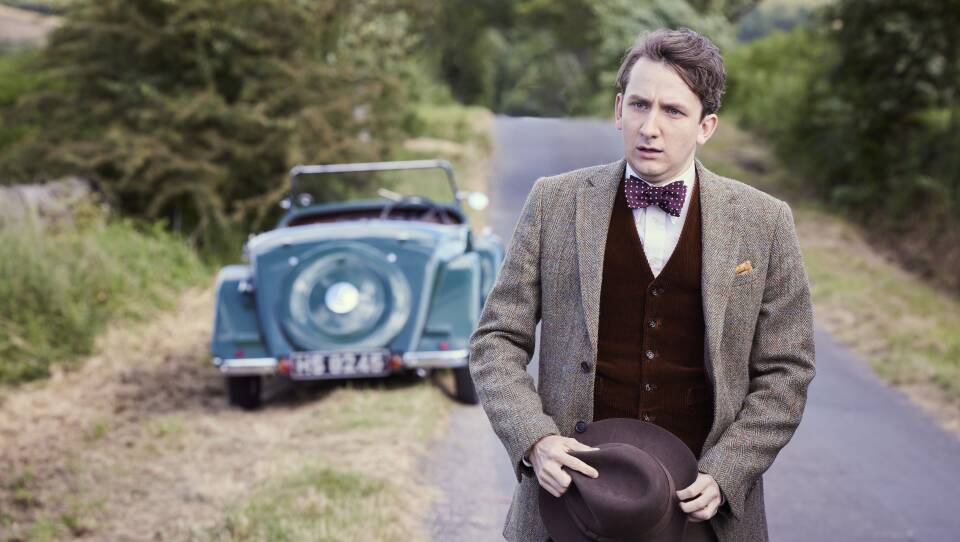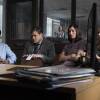Throughout All Creatures Great And Small Season 4, several arcs attracted viewer interest. However, Richard Carmody’s appearance as the newest member of the Skeldale House veterinary practice stands out in terms of both a rewarding emotional journey and a rewarding career trajectory. Throughout the season, there were both subtle and obvious hints that if Carmody were living in 2024, he would be described as neurodivergent or on the autism spectrum. This piece will detail the case for this reading and the importance of representing neurodivergence in period drama fandom as a whole.
Richard Carmody or “Cardomy” to Mrs. Pumphrey (or “Cardamom” to Twitter) makes a splash introduction in Episode 3 “Right Hand Man”. He arrives from London, and ends up wandering lost in Darrowby as the street signs have been removed to repel the German invasion. He’s younger and more formally dressed than James and Siegfried. Carmody is not only relatively untested in regards to fieldwork, but also lacks experience with communicating disease prognosis and treatment to patients. He also doesn't wear galoshes or other protective gear against the elements like the other vets.
Carmody’s introduction hints strongly to neurodivergence, and the first clue is a visual one: there’s a strong thematic link between Carmody’s attire and another famous British character known for quirkiness. Several iterations of the Doctor from Doctor Who have been described as neurodivergent, but Matt Smith’s Eleventh Doctor is the best comparison point. While this could be due to both Doctor Who Season 5 costume designer Ray Holman and All Creatures’ costume designer Ros Little utilizing vintage Harris and similar tweeds, the concept of signifying quirkiness and outsider status with a bow tie is a through line in British pop culture. While Carmody’s eventual degree will be in veterinary science, Eleven’s Doctor has the vibes of a mad history professor. Actor James Anthony-Rose said in his interview for MASTERPIECE Studio that he decided during his costume fitting that a bowtie was not an over-the-top way to distinguish Carmody from the rest of the Darrowby residents.
If viewers missed the visual hint, Carmody’s confusion over why Mrs. Pumphrey treated Tricki Woo and Cedric like human children was a behavioral hint towards being on the spectrum. Mrs. Pumphrey’s behavior did not make sense to Carmody, and his instinct to question why did not go over well. His brand of forthrightness was not an easy match for sentimental pet owners and farmers who place great emotional value on their animals. Carmody’s second patient, Tom Chapman’s favorite horse Diesel, was another test of his existing skills. Horses are his chosen specialty, however, he struggled with translating medical jargon into terminology Grace Chapman could understand. Siegfried was initially skeptical of his ability to assist him or James on cases, but after Diesel’s accidental impalement it was clear having a third pair of hands for surgery can save an animal’s life.
For most vet students the sight of blood or how messy animals can be are natural hurdles to overcome, but for Carmody, the road is a bit harder as also struggles with taking colloquialisms and slang at face value. Further, he cannot immediately anticipate how the farmers and pet owners react to his delivery and affect. In episode 4 “By The Book”, the Crabtree family is especially distressed by both Carmody’s diagnosis of brucellosis and the bluntness of his attitude towards the fact one of the infected cattle was sharing space with healthy cattle. Falling in the mud was a low point, but James turns it into a net positive by arranging for Carmody to have a practice session with Mrs. Hall pretending to be a Dales pet owner.
James’ reaction makes it clear that he is aware that Carmody isn’t going to learn via being yelled at or mocked, because his ability to communicate with others is different. Later on in the episode, Siegfried confiscates Carmody’s textbooks but ends up reversing course and admits that Carmody’s tendency to read medical research provides the key to not only figuring out if Helen was exposed to the brucellosis bacteria, but also the long-term solution to eradicating the infection. By the end of the episode, Carmody learns what kinds of questions to ask and how to connect with the animal owners while not losing his previous knowledge or being forced to behave in a way that’s not natural for him, which is harmful for neurodivergent people. It would not have been realistic for the average Yorkshire farmer to know about Applied Behavior Analysis therapies, but the storyline can be interpreted as affirming some of the most common critiques of this therapy type by today’s autism advocates.
This element of Carmody being affirmed and appreciated is why fans who self-identify as on the spectrum saw themselves in Carmody and why he’s a positive representation of neurodivergence overall. James Anthony-Rose also said in his MASTERPIECE Studio interview that fans are correct in interpreting Carmody as on the spectrum. He’s also a rare example of representing someone on the spectrum in a non-mystery period drama. While Sherlock Holmes and Endeavour Morse have also been described as being on the spectrum or having a similar form of neurodivergence, both of these portrayals perpetuate the idea that their skills and views of the world are only valuable in the worst situations of humanity. In addition, both Holmes and Morse struggle with developing relationships outside of work. In contrast, throughout the season, Carmody becomes a member of the Skeldale family and the wider community.
Episode 5 “Papers” is a high point in Carmody’s character arc not only because of how he forms a bond with Mrs. Pumphrey, but also because the storyline revealed a neurodivergent trait that isn’t often covered on television. Carmody can’t help treat the horses if he doesn’t know how to drive to the farms. His first set of lessons ends in disaster, but eventually with some urging by Siegfried, Mrs. Pumphrey decides to take Carmody out for a drive in her Rolls Royce. She pinpoints anxiety as a stumbling block to learning the motions of driving a manual transmission, and tells Carmody he needs to talk to Tricki Woo in the front seat. Talking to Tricki is both an outlet for the random facts Carmody collected in his head, and also something to distract him from overthinking the mechanics of driving. Carmody earns the distinguished title of Uncle, and also successfully handles the Rolls Royce at the end of the drive. This scene was the one that I felt seen by, because driving is also something I still struggle with mastering.
The training wheels come off for Carmody in Episode 6 “Home Front” as James has left for RAF training, and Carmody now has to assess cases on his own. He correctly diagnoses Richard Alderson’s calf Smokey as having a blocked rumen, and knows that the home remedy is not going to replace surgery. Even though Alderson pushes back on his diagnosis, Carmody stands his ground and doesn’t celebrate when Smokey’s condition advances to the point of surgical invention. His discomfort at social situations returns when Siegfried examines Helen’s stomach to detect Baby Herriot’s heartbeat. Siegfried says that Carmody's learning what to do in a medical emergency outweighs his natural inclination towards modesty.
The Season 4 Christmas special “A Wing and a Prayer” shows just how far he’s come in regards to being accepted as a part of the community. Carmody was raised by atheists who did not celebrate Christmas or any other winter-season holiday. The folks at the Drovers ply him with mulled wine, and Mrs. Pumphrey insists on Uncle Carmody sitting next to Tricki Woo. His awkwardness regarding unfamiliar social situations fades quickly as he’s shown the warm and fuzzy feelings the holidays can uniquely provide. By the end of the annual holiday party, Carmody is offered a spare room at Skeldale and thanks Mrs. Hall for becoming the mother figure he never knew he needed. He is no longer the overdressed outsider, but a full member of the family.
While it is too soon to say if Richard Carmody will remain at Skeldale House in Season 5, we can still appreciate that his character spoke to fans who didn’t always see characters who shared their way of looking at the world. If you didn’t realize that Carmody could be interpreted as on the spectrum, rewatch Season 4 with this article in mind. And let’s hope that in the future there will also be women and people of color shown to be also on the spectrum in future MASTERPIECE productions.





